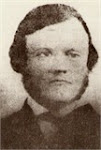Try out this pair of unusual reads. They are unlike only in that both are idiosyncratic and both are short, fast reads. Both books are available on Linkcat: A dirty job and The three-arched bridge

In A Dirty Job: A Novel, author Christopher Moore creates a wildly imaginative, often hilarious world of Death that somehow manages to be poignant at the same time. How does he do that?? I don't know, but it's a lot of fun, a great read, and yet touches the human spirit.
Moore's protagonist Charlie Asher, a mild-mannered recently widowed dealer in used goods is unsettled to discover that he has somehow become a Death Merchant. He has to track down people who have just died or are about to die and collect their soul vessel so it can be passed on to somebody else who really needs it. Simple enough, or so it seems until the Morrigan show up. The Morrigan are large black bird-like creatures who live in the storm sewers of San Francisco. They are at odds with Asher and his colleagues. And then some of the people who are supposed to die don't. Lack of death causes a Death Merchant a lot of trouble. It turns out that the lack of death is no accident, but is the result of a third-party intervention that involves really strange creatures made up of parts of dead animals sewn together and wearing nightgowns.
So, how does all that rollicking weirdness get poignant? Well, underneath all the weirdness, his book really is about Death, the death of spouses and mothers and lovers and how we deal with it. Moore's Note and Acknowledgement explain his inspiration for some of his ideas, including the dead animals in dresses. Check out art by Monique Motil. http://www.moniquemotil.com/
A Dirty Job is a lot of fun, a quick read, that's sure to brighten your day (hey, you're not dead yet, are you?).
Taken at face value, The Three-Arched Bridge is a story about the building of a strategically important bridge in 1377 as the Ottoman Empire expanded into southeastern Europe in the dying days of the Byzantine Empire. The local people do not welcome the change, in particular the `Boats and Rafts' company that ferries travelers back and forth across the Ujana e Keqe (`Wicked Waters'). Construction of the bridge is sabotaged, but by whether by human means or by `naiads' or water nymphs is subject to debate. It appears the bridge may fail altogether until an old myth of walling up a woman in the wall of a castle comes to a twisted reality when one of the masons is `immured' in the bridge.
Kadare's narrator, Gjon, is a local monk with a skill for languages who serves as translator at various key meeting. The monk exhibits a sharp eye for detail. He travels nears an encampment of Turks and returns greatly fearing their advance. They are foreign in worship, dress, and song (Their music is `hashish dissolved in the air').
Kadare's writing entrances the reader. In a way that this reader found reminiscent of Flannery O'Connor, once the book has been begun, it must be finished. It's been called `strange, vivid, ominous' by Patrick McGrath in the NYT Book Review and I can't do better than that. A sense of foreboding, if not outright dread lingers over the pages.
Kadare's story seemingly contains an analogy, but what it is, is not obvious to the Western, or perhaps simply non-Albanian reader. It has been suggested that the analogy is to the collapse of the Soviet Union, but the book was originally published a decade earlier in Albania in 1978, although it was not published in English until 1997. Others have suggested a resonance with the Kosovo-Serbia conflicts and that rings truer because of the long history of that conflict (the great Kosovo battle that Serbs tout occurred in 1398 just 12 years after the story of the bridge.). The simpler answer is that the book is a story about the history and mythology of the clash between the Ottomans and the Byzantines, Islam and Christian, Turks and European set a crucial time and place in that interaction.
Kadare himself is a controversial and enigmatic figure. He published books in Albania under the eye of dictator Enver Hoxha, but then fled to France in 1990 just when the regime was collapsing. His claim to dissident status is hotly debated.
Moreover, English versions of his books have suffered in the past from being twice-interpreted: first from Albanian to French and then from French to English. The Arcade Publishing edition, however, was translated directly into English from Albanian.
This exchange (http://www.nybooks.com/articles/963) on the New York Review of Books suggests both Kadare's enigmatic side and possibly the problems of translation - he doesn't seem to understand that a review he complains was almost entirely laudatory!
Whatever you decide the analogy is or think about Kadare, his writing is arresting. Give The Three-Arched Bridge a try and see for yourself. Very highly recommended.

















No comments:
Post a Comment